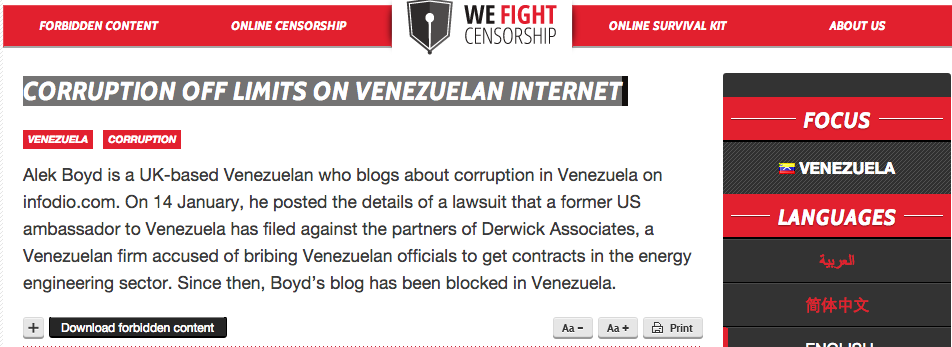The Wall Street Journal's Caracas' man, Ezequiel Minaya, posted an article a couple of days ago entitled "Venezuela's Press Crackdown Stokes Growth of Online Media", in which he lays out some of the problems the Venezuelan press is experiencing. Where I must depart from Minaya's POV is where he says "The government hasn't been as aggressive online, though regulations policing media content have been extended to the Internet." Perhaps he missed this other WSJ article from February this year, which claimed:
The Venezuelan government, besieged by nationwide protests, appears to have stepped up its censorship of Internet services used by demonstrators and sites that have criticized the government response to the unrest, technology firms and researchers said.
Dozens of websites including Pastebin.com, which protesters used to share photos, have been blocked in Venezuela, according to Herdict, an initiative under Harvard University's Berkman Center for Internet & Society that collects data on Internet filtering. Such blocks are usually carried out by local Internet service providers, which interrupt the connections between users' computers and the servers that host the websites or services they are using.
"Venezuelans are seeing a creeping curtain of censorship from a regime desperate to hide the brutal repression meted out to protesters and innocent civilians," wrote Alek Boyd, founder of INFODIO, a mostly English-language blog about corruption in Venezuela, in a post pleading with readers to republish messages on social media in Venezuela.
By blocking specific domains or IP addresses, service providers cut off the connection between a user's computer and the website or service they are trying to access, a crude way to limit access to a list of known websites. Such techniques have long been used in countries like China, where the government strictly controls the media and Internet, but China also uses more-sophisticated filtering technology that can also detect banned keywords within unknown Web pages and disrupt access to those pages as well.
The access disruptions in Venezuela were already having an effect. Mr. Boyd of INFODIO said traffic to his site dropped to between 4,000 and 6,000 visits a day, compared with as much as 20,000 a day before it was allegedly blocked in the country in mid-January. Mr. Boyd is also looking at services that will help make it easier for his readers to get around any blocks.
A while ago, I spoke with Minaya about online censorship and being a blogger in Venezuela these days. My case, if I may say so, is unique, for, as far as I am aware, not only I am the only Venezuelan blogger whose site has been censored, although I write mostly in English, but the proxies that I have linked to in my Twitter profile for Venezuela-based readers have systematically been blocked too. Even Reporters Without Borders, which runs a campaign aptly named We Fight Censorship, reported on my case in an article entitled "CORRUPTION OFF LIMITS ON VENEZUELAN INTERNET"

But Chavismo's antics are not limited to just censor a website. Close collaborators of Nicolas Maduro, like Primicias24.com Carlos Herrera, have posted stuff that goes well past mere smearing into the realm of the impossible. While pesky journalists in Venezuela can expect a visit from intelligence operatives at any moment, a recent comment made by someone totally unrelated to my regular blogging activities -along the lines of "they're looking for you and want you dead"- left me in no doubt as to what could happen if I lived in Venezuela.
Chavismo controls CANTV, and with it 87% of internet traffic. Why would a State-owned telecom company go to the trouble of blocking a blogger's site as well as the proxies that allow people to access that site? And, can that be termed as "The government hasn't been as aggressive online"?

